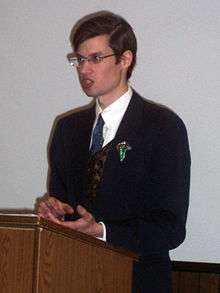David Salo
David I. Salo is a linguist who worked on the languages of J. R. R. Tolkien for the Lord of the Rings film trilogy, expanding the Elvish languages (particularly Sindarin) by building on vocabulary already known from published works, and defining some languages that previously had a very small published vocabulary. In 2003, he was a graduate student in linguistics at the University of Wisconsin–Madison.[1]
David I. Salo | |
|---|---|
 David Salo giving a speech in Bloomington, Illinois, April 30, 2005 | |
| Nationality | American |
| Education | University of Wisconsin-Madison |
| Occupation | Linguist |
| Known for | Languages constructed by J. R. R. Tolkien |
Salo on Tolkien's languages
David Salo's interest in Tolkien's languages arose when he read Tolkien's works as a boy. As an undergraduate at Macalester College he studied Latin, Greek, and linguistics, and used the knowledge gained to improve his understanding of Tolkien's languages.[2] In 1998 he was among the founders of the Elfling mailing list for Tolkienist language enthusiasts.[3] In 2004 he published a linguistic analysis of Sindarin: A Gateway to Sindarin: A Grammar of an Elvish language from J.R.R. Tolkien's Lord of the Rings (ISBN 0-87480-800-6). This book was reviewed in 2006 in volume 3 of the journal Tolkien Studies,[4] and it was further reviewed in the context of Tolkienian linguistics as a whole in volume 4 of Tolkien Studies (2007).[5]
Salo was contracted for The Lord of the Rings film trilogy to write all the material in Elvish, Dwarvish, and other languages for the movies, as well as assist with other language-related items such as the Tengwar and Cirth inscriptions which appear in the movies. Salo also translated the lyrics for the movie soundtracks.[6] Subsequently, Salo provided similar services as the Tolkien language consultant for The Hobbit film series.[7]
Salo on Conlanging
Salo also co-administrates one of the larger online forums for conlangers, Facebook's Constructed Languages [8] group.
References
- Smith, Susan Lampert (2003-01-19). "Linguist Is A Specialist In Elvish, The Uw Grad Student Provides Translations For Lord Of The Rings Movies". Wisconsin State Journal. William K. Johnston. p. C1. ISSN 0749-405X. Retrieved 2007-11-14. (also available here Archived 2004-12-05 at the Wayback Machine)
- "Need an Elvish Translator? We've Got the Right Person for the Job" (PDF). Artes Liberales Today. College of Letters & Science, University of Wisconsin–Madison. 7 (1): 4. 2002. Archived from the original (PDF) on February 21, 2007. Retrieved 2007-11-15.
- "Elfling FAQ (Frequently Asked Questions) List". nellardo.com. Retrieved 2010-12-29.
- Straubhaar, Sandra Ballif (2006). "Gateway to Sindarin (review)". Tolkien Studies. West Virginia University Press. 3: 166–173. doi:10.1353/tks.2006.0033. ISSN 1547-3155.
- Hostetter, Carl F. (2007). "Tolkienian Linguistics: The First Fifty Years". Tolkien Studies. West Virginia University Press. 4: 1–46. doi:10.1353/tks.2007.0022. ISSN 1547-3155.
- Wilonsky, Robert. "Talkin' Tolkien". Phoenix New Times. Retrieved 2007-11-14.
- "David Salo, Linguistic Consultant for The Hobbit, speaks at Geek Kon". TheOneRing.net. Retrieved 2012-12-31.
- "Constructed Languages group". Retrieved 2017-04-09.